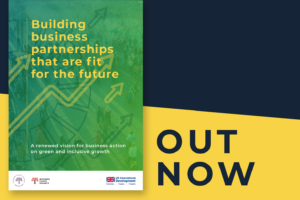Besides the regular festivities, food and frolicking, December is a time for reflection. Commentators love to look back on The Year That Was – debating everything from the most gripping news stories to the highest grossing movies.
But it’s not often that you get to hear someone like the head of the UN Global Compact, Georg Kell, reflect on a whole decade of global change. At the UNGC’s recent, end-of-year event in London, he highlighted seven key trends that have shaped business and society during the Compact’s 10 year history.
Kell outlined a clear evolution from the early days of compliance through to corporate responsibility – and now to embedded sustainability. As firms became more globalised, it became clear that not acting sustainably would lead to huge risks and constrain long-term growth. As a result, the idea of responsible business has now become mainstream. Multinationals compete on green credentials, eager to show their positive social and environmental impact. Investors are increasingly looking at sustainability indicators and universities are training tomorrow’s business leaders in ethics and corporate citizenship. Not to mention, companies and NGOs have become more collaborative than confrontational, with cross-sector partnerships now well-accepted.
A similar story emerges when looking back at the history of the International Business Leaders Forum (IBLF), one of the first organizations to link business with sustainability. When IBLF was established 20 years ago, corporate responsibility was but a seedling idea.
With careful cultivation and nurturing, it took root in the hearts and minds of visionary business leaders around the world. Reports such as Business and the MDGs and The Business of Peace helped redefine the relationship between business and development. Companies like Coca Cola, Accenture, Cadbury and Diageo pioneered change by demonstrating the positive social and environmental impacts of responsible business. Training in cross-sector partnerships, first delivered by IBLF in 2003, is now being delivered to over 600 senior participants from more than 70 countries. As IBLF celebrates its 21st anniversary next year, we look forward to the next stage of the journey towards corporate responsibility.
What do I find most exciting in this evolution? Watching corporate responsibility move out of the realm of philanthropy and into core business. Now more than ever, companies are showing that by designing their operations in a different way, they can improve lives at the same time as making profits. The Business Call to Action, a global initiative aimed at stimulating pro-poor business, counts more than 25 examples of companies that reach the poor through their supply and distribution chains, or by developing new products and services. These innovative business models are unlocking new markets, developing robust supply chains, reducing risk and tapping into local knowledge.
Case studies show that competitiveness and value creation is actually enhanced by engaging with poor and marginalized communities. For example, Coca-Cola’s micro-distribution centres generate annual revenues of more than US$550 million across 15 African countries. The Cadbury Cocoa Partnership has significantly reduced risk in the supply chain and opened up Fairtrade markets worth up to US$350 million each year.
Of course not all firms have followed this evolutionary trend. In many countries and sectors, compliance to regulations and standards remains an effective way to act responsibly. But if the number of companies signing up to initiatives such as the UN Global Compact and the Business Call to Action is any indicator, responsible and inclusive business is the next big step to a sustainable future.











One Response
Excellent points, Suzanne. With just five years left to achieve the MDGs, it is exciting to see businesses think outside the CSR box to promote real, sustainable economic growth within BOP markets.